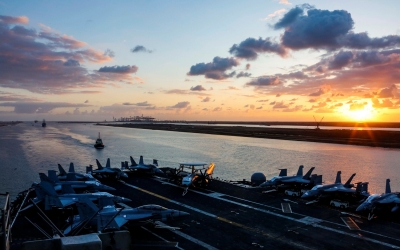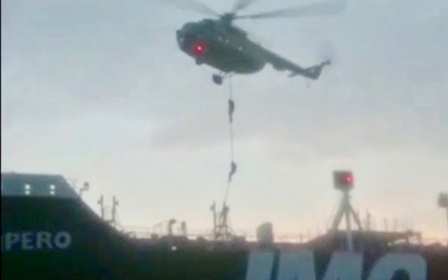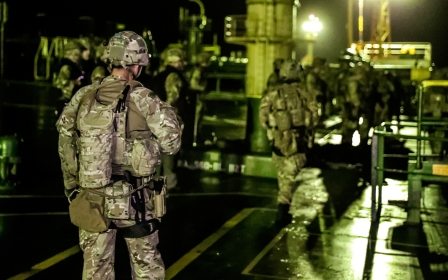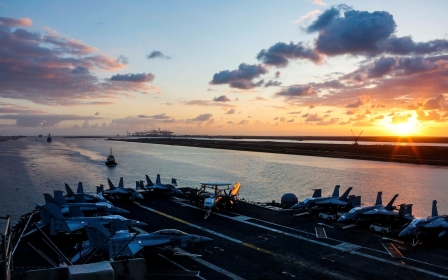Saudi Arabia calls for action after Iran's seizure of British ship

Saudi Arabia on Sunday slammed Iran's seizure of a British-flagged tanker in the Strait of Hormuz as "completely unacceptable" and urged world powers to "take actions to deter such behaviour".
"Any attack on the freedom of navigation is a violation of international law," Saudi Minister of State for Foreign Affairs Adel al-Jubeir wrote on Twitter. "Iran must realise that its acts of intercepting ships, including most recently the British ship, are completely unacceptable."
The Iranian capture of the ship in the global oil trade's most important waterway was the latest escalation in three months of spiralling confrontation with the West that began when tighter US sanctions on Iran took effect in May. Washington imposed the sanctions after President Donald Trump pulled out of a deal that had provided Iran access to world trade in return for curbs on its nuclear programme.
Still, the UK has sought a diplomatic solution to the incident and British Prime Minister Theresa May has called a meeting of the emergencies committee on Monday to discuss Iran's seizure of the UK-flagged oil tanker, her office said.
"As well as receiving the latest updates from ministers and officials, the... meeting will discuss the maintenance of the security of shipping in the Persian Gulf," a Downing Street spokeswoman said on Sunday.
British Foreign Secretary Jeremy Hunt spoke on Sunday to his French and German counterparts over Iran's seizure of the tanker, his office said.
"Both ministers agreed with the foreign secretary that safe passage for vessels through the Strait of Hormuz is a top priority for European nations, while avoiding any possible escalation," it said in a statement. "They agreed to keep in close contact and to work together to achieve this," the statement said.
On Saturday, Britain had urged Tehran to de-escalate tensions in the Gulf by releasing the tanker it said had been illegally seized in Omani waters.
Also on Saturday, retired British Admiral Alan West, a former chief of Naval staff, warned against a western attack on Iran in the Guardian: “Some powerful groups in Israel, Saudi Arabia and the United States want war and think a precision strike against key parts of Iran’s military capability would lead to regime change. They are wrong.
"It would lead to an open-ended war with catastrophic consequences across the region and the globe.”
Kuwait said on Sunday that it is "following with extreme concern" the latest escalation in the Gulf region, after Iran seized the British tanker, Kuwait's news agency reported.
Kuwait stressed that the continuation of such acts would “increase tensions and expose maritime safety to a direct threat, which will require the international community to intensify its efforts to contain the escalation".
Kuwait called on all parties to exercise restraint and respect international maritime law to ensure maritime security in the region.
On Sunday, Oman called on Iran to release the Stena Impero, which was impounded with its 23 crew members at the port of Bandar Abbas after the Islamic Revolutionary Guard Corps (IRGC) seized it in the Strait of Hormuz on Friday.
Oman's Sultan Qaboos adheres to a strict policy of non-interference in regional affairs, maintaining relations with rivals Saudi Arabia - a staunch US ally - and Iran.
The Gulf state urged London and Tehran to resolve their dispute through diplomacy.
Iran, which says it seized the tanker for breaking "international maritime rules" remained defiant towards UK, European and US calls to release the ship and said it has launched an investigation.
Tensions in the Gulf have soared since May, with Trump calling off air strikes against Iran at the last minute in June after the Islamic republic downed a US drone. The US has also blamed Iran for multiple attacks on tankers in the Gulf.
Prior to Iran's seizure of the British ship in the Gulf, British Royal Marines boarded an Iranian tanker, Grace 1, off the coast of Gibraltar earlier this month and seized it over accusations it was breaking sanctions by taking oil to Syria.
Iran demanded the release of the ship and an Iranian Revolutionary Guards commander threatened to seize a British ship in retaliation.
Middle East Eye delivers independent and unrivalled coverage and analysis of the Middle East, North Africa and beyond. To learn more about republishing this content and the associated fees, please fill out this form. More about MEE can be found here.






